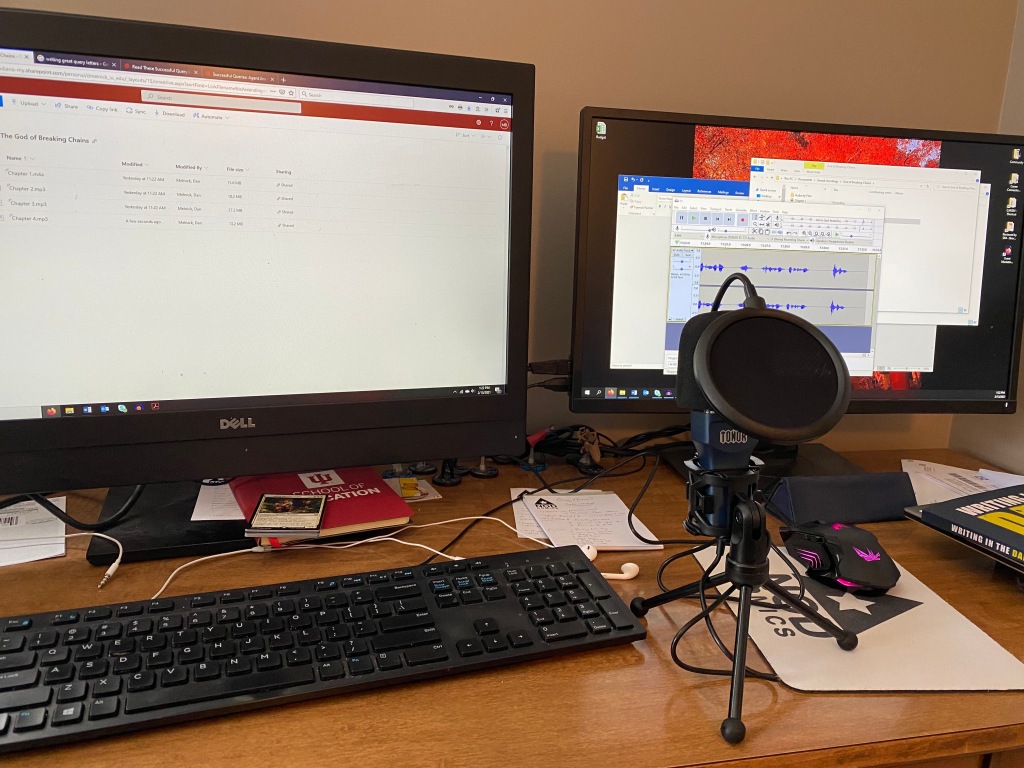So I’ve been working on a new manuscript again and boy I’ve got to tell you, it feels great! I’d been banging away at what should have been a short story, but was becoming a novella for a while but I let that project peter out. I’m not the best short story writer so I tend to work on those when the inspiration strikes. The last one I wrote I started awhile ago, got about third of the way through, put it aside for over a year, and came back and finished it. To this day, I think it’s the greatest piece of fiction I’ve ever written. Shelving a short story for a bit doesn’t bother me. Abandoning a novel? Now, that’s another story.
That’s why I tend to get tunnel vision when I start a new manuscript. I need the brainstorming, prewriting, outlining, and finally the first draft itself to all kind of fall into place. The ones I’ve struggled with the most are the projects I’ve rushed. I finished this outline a few months ago, sat on it while we moved houses, but now I’m up and running … well, writing … Three chapters in and I’m loving the work again.
When I haven’t been writing, I’ve been doing a lot of reading. If I can’t practice the craft, then I at least try and keep my mind sharp. Most books were read for enjoyment, but even so, it’s hard not to analyze the style and structure. Once you’ve peered beyond the Matrix Code, I can still appreciate the lady in the red dress, but I’m also looking at the 1s and 0s.
So here’s what I’ve been reading since last post:
Unsouled – by Will Wight – I came across this book on a reddit thread and I didn’t realize how popular it was until after I’d read it. I thought the writing is pretty rough around the edges, but the story itself is awesome. Maybe it’ll get more polished in later books as Wight writes more. You know when they tell you nobody reads for plot, they read for character? That’s maybe 90% true. The character in this book is likeable enough, but man what kept me going was more of that sweet, sweet worldbuilding.
The Meiji Restoration – by W.G. Beasley – Doing some light reading for a future novel. I was looking for a good background on this period in Japan’s history and this book is apparently the best place to start. Make no mistake, it’s pretty much a text book, but it’s so detailed and covers all the major angles. Really fascinating and accessible.
The Curse of Chalion – by Lois McMaster Bujold – Another one that comes highly recommended, but I’ve got to tell you, I don’t get it. Something about the beginning grabbed me. Not like a hook, but more like a warm blanket. It lulled me into wanting to read more and I did. But then … nothing happens. For many, many pages. I guess if you’re into the day to day of fantasy court life then this could totally be your jam. For me, I had to call it quits halfway through.
Steel Crow Saga – by Paul Kreuger – Speaking of nothing happening … hoo boy! Again, strong start with some solid worldbuilding but then its just chapters and chapters of characters walking and talking. Characters who I don’t like. At all. I find their smarmy, smugness, frustration, and resentment completely uninteresting. They make sense for their backstories, but they don’t move on quick enough. I don’t need a 180, but there weren’t enough little character moments for me to see growth of any kind. This one I happily put down halfway through.
Emperor of the Eight Islands – by Lian Hearn – The funny thing about this one is that I actually had a preview copy of the first couple of chapters that I picked up ages ago at a World Fantasy Convention because I thought it looked cool. Forgot about it and never read it. Fast forward a few years later and here we are. It wasn’t bad. I liked Hearn’s Heaven’s Net is Wide and Across the Nightingale Floor enough. I’m glad the story in EotEI didn’t drag out because every character was pretty much miserable all the time and I just couldn’t handle that for a thousand pages. There were some good moments, but I’m not really in a rush to read book 2 yet. It doesn’t mean it’s off my radar, but I have a lot to read between now and then.
Shadows of Innistrad and Eldritch Moon collected stories – by miscellaneous authors – I’m a huge fan of Magic: The Gathering and those of who you know what I’m talking about, my all-time favorite plane is Innistrad. I just love it. I run a D&D game in that setting and even have the MTG artbook for the original set. The collector in me will one day collect a copy of each card from that set too. Why? Why not. Anyway, I’ve long since had a passing interest in the greater story behind MTG and discovered these collections of bundled stories that were originally released on their blog. Reading it now like two complete novellas was pretty cool. With different authors and characters, some stories were better than others. My big takeaway though? Tamiyo is awesome. And not just because I’m one of those people who have nostalgic fondness for Kamigawa.
The Black Prism – by Brent Weeks – What I’m reading now. I’m digging the short chapters that really keep the story moving. Though that beginning is a textbook example of fantasy jargon. I’m a fantasy writer and there were times I had a hard time following, but I tend to trust the author and the reading experience. I’ll sit back and let it all soak in. So far I’m enjoying it.

